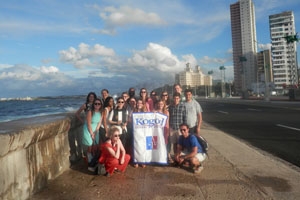Business
International Management Practices Course to Include Spring Break Travel Component to Cuba Pairing Classroom Studies with Experiential Learning

Each time Heather Elms, Associate Professor of International Business at Kogod, has traveled with her students to a foreign country for an international experience course, she takes pride in their level of preparedness. She’s been told repeatedly that the AU students “ask good questions” and “really understand what’s going on” in the countries they’re visiting.
“[That’s because] we emphasize the academic content,” Elms says, stressing the importance of studying each country’s business conditions in the classroom prior to traveling. Before students in the spring 2018 IBUS-244 International Management Practices course travel to Cuba this spring break, they’ll have spent the semester learning about differences between Cuba’s business environment and management practices and those of other countries.
Since the students understand Cuba’s history and its present business climate, they’re better positioned to analyze and appreciate what they see—particularly since they will need to synthesize their takeaways into a final research paper and presentation.
“Kogod has been focused on experiential programs for a very long time,” Elms says. But for those experiences to be truly beneficial and transformative, she emphasizes that students need to put in the preparation to make the most out of them.
Broadening Students’ Perspectives
While the itinerary for the upcoming trip is still being finalized, Elms says they are planning to visit a variety of businesses to give students a diverse perspective into the management and operations of Cuban businesses.
Despite the number of international students at AU, Elms says there’s a natural tendency among faculty and students to still focus on the American business environment and American management practices. “There are huge differences in ways that companies are run in different countries,” she says. By visiting other places and seeing how businesses function, “it makes [students] more aware and sensitive, not just culturally, but in terms of critical thinking.”
Private business has only cropped up recently in Cuba—most businesses are still state-owned. While it’s important for students to understand this on an academic level, Elms explains there’s really no substitute for seeing it in person.
Harrison Wolff, BSF ’18, who participated in the course and trip to Cuba in 2016, says that a visit to an agricultural cooperative was a highlight and eye-opening experience.
“You can read as much as you want about a country and its policies, but you never truly understand it until visiting,” Wolff says. “The travel component was crucial for understanding the Cuban economy and government policies.”
The Cuba-U.S. Relationship
Particularly when traveling to a country like Cuba, it’s important for students to be aware of the political climate and the country’s current relationship with other countries. When Elms first took the students to Cuba in 2016, for example, the United States embassy had just reopened and relations between the two countries was at its best in more than 50 years. But as the new administration has reversed course, recently removing many staff members from the U.S. embassy in Havana, students need to stay up to date.
“We are constantly monitoring the situation,” Elms says, referring to both the political situation and the conditions in Cuba following the devastation felt by the country following Hurricane Irma.
Elms appreciated the opportunity to take the students to Cuba because of how timely it was in 2016, and that remains the case today. “We do want to make [the course] topical,” Elms says. She is hopeful that the students will be able to visit the U.S. embassy and participate in some disaster relief efforts to support the local community.
In addition to learning about Cuban business, Elms also wants the students to immerse themselves in Cuban culture. The students will attend a show at the Tropicana, a state-owned cabaret. All of the participants will also be staying in residencias (or “casas particulares”)-- homes or apartments owned and rented out by Cubans. Elms says the opportunity to stay in a local neighborhood and get to know a particular community helps the students connect to the country. “It gives you a better feel for how people live.”
Jolie Roetter, Kogod’s Global Learning Programs Director, adds, “We make an effort to ensure that we are supporting the citizens of Cuba as much as possible during our time on the island. In addition to staying residencias, we meet with a variety of cooperatives and eat our meals in paladares (privately run restaurants).”
It’s those kinds of connections and in-person encounters that enable students to have a true experiential learning opportunity and reinforce the lessons they learn in the classroom before visiting Cuba.
“It’s going to be a fantastic, eye-opening course,” says Elms. “Many of the students in our previous course on Cuba described it as a ‘once-in-a-lifetime’ opportunity.”
The deadline to register for the spring 2018 IBUS-244 course is October 27, 2017. Visit us online for more information!